
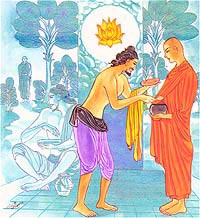
Verse 290. Give Up A Little, Achieve Much
If one should see great happiness
in giving up small happiness
one wise the lesser would renounce
the greater full-discerning.
Explanation: By giving up a modicum of pleasure, which the worldly pursuits bring, if one can be assured of tremendous pleasure – which is Nibbana – the wise person should give up the little pleasure.

Verse 291. When Anger Does Not Abate
Who so for self wants happiness
by causing others pain,
entangled in anger’s tangles
one’s from anger never free.
Explanation: The individual who achieves happiness by inflicting pain on others is not freed from anger because he is entangled in the web of anger due to the contact of the anger of other people.

Verse 292. How Blemishes Increase
What should be done is left undone
and done is what should not be done,
ever the pollutions grow
of those ones proud and heedless.
Explanation: If people do what should not be done, and neglect what should be done, the blemishes of those proud, slothful ones begin to increase.

Verse 293. Mindfulness Of Physical Reality
But for who always practice well
bodily mindfulness,
do never what should not be done,
for mindful ones, the full-aware,
pollutions fade away.
Explanation: If one were to practice constantly on the mindfulness of physical reality, maintaining steady attention on what has to be done, they will shun what should not be done. The blemishes of those mindful, alert will get eroded.

Verse 294. The Destroyer Who Reaches Nibbana
One’s mother and father having slain
and then two warrior kings,
a realm as well its treasurer,
one goes immune, a Brahmin True.
Explanation: The brahmin kills the mother – craving, kills the father – egotism, self-cherishing: They represent the two views, Eternalism and Nihilism, opposed to Buddhist thought. The subordinates are clinging to life. And he destroys the defilements which cling to life. Having destroyed all these, the brahmin (arahat) goes without punishment.
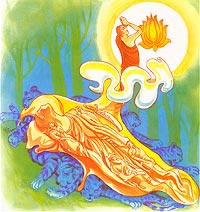
Verse 295. The ‘Killer’ Who Goes Free
One’s mother and father having slain
and then two learned kings,
as well the fifth, a tiger fierce,
one goes immune, a Brahmin True.
Explanation: The brahmin (arahat) kills the mother – craving; kills the father – egotism; kills the two learned kings. They represent the two false views eternalism and nihilism. He kills the five tigers (sensuality, hate, mental inertia, worry and skeptical doubt) that obstruct the path. And, having done all these killings, the arahat goes about unaffected.
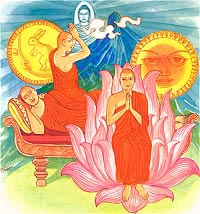
Verse 296. Reflect On The Virtues Of The Buddha
Well awakened, they’re awake
ever the Buddha’s pupils
who constantly by day, by night
are mindful of the Buddha.
Explanation: Those disciples of the Buddha who are mindful of the virtues of their Teacher day and night, arise wide awake and in full control of their faculties.

Verse 297. Reflect On The Virtues Of The Dhamma
Well awakened, they’re awake
ever the Buddha’s pupils
who constantly by day, by night
are mindful of the Dhamma.
Explanation: Those disciples of the Buddha who are mindful of the virtues of the Dhamma day and night, arise wide awake and in full control of their faculties.
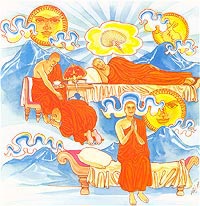
Verse 298. Reflect On The Virtues Of The Sangha
Well awakened, they’re awake
ever the Buddha’s pupils
who constantly by day, by night
are mindful of the Sangha.
Explanation: He has savoured the taste of solitude. He has also experienced the flavour of tranquillity arising from the absence of blemishes. Enjoying the sweetness of the realistic awareness he is unaffected by blemishes and is bereft of evil.

Verse 299. Reflect On The Real Nature of the Body
Well awakened, they’re awake
ever the Buddha’s pupils
who constantly by day, by night
are mindful of the body.
Explanation: Those disciples of the Buddha who are mindful of the real nature of the body day and night, arise wide awake and in full control of their faculties.
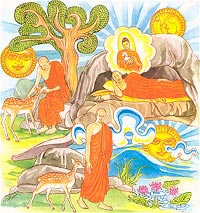
Verse 300. Reflect On Harmlessness
Well awakened, they’re awake
ever the Buddha’s pupils
who constantly by day, by night
in harmlessness delight.
Explanation: Those disciples of the Buddha who take delight in harmlessness day and night, arise wide awake and in full control of their faculties.

Verse 301. The Mind That Takes Delight in Meditation
Well awakened, they’re awake
ever the Buddha’s pupils
who constantly by day, by night
in meditation take delight.
Explanation: Those disciples of the Buddha who take delight in meditation day and night, arise wide awake and in full control of their faculties.

Verse 302. Samsara - Journey
Hard’s the going-forth, hard to delight in it,
hard the household life and dukkha is it too.
Dukkha’s to dwell with those dissimilar
and dukkha befalls the wanderer.
Be therefore not a wanderer,
not one whom dukkha befalls.
Explanation: It is hard to become a monk; it is hard to be happy in the practice of a monk. To live with those of a different temperament is painful. A traveller in samsara is continually subject to dukkha; therefore, do not be a traveller in samsara; do not be the one to be repeatedly subject to dukkha.

Verse 303. He Is Honoured Everywhere
Who’s full of faith and virtue,
of substance, high repute,
is honoured everywhere,
wherever that one goes.
Explanation: He who is full of faith and virtue, who also possesses fame and fortune, in held in reverence wherever he goes.
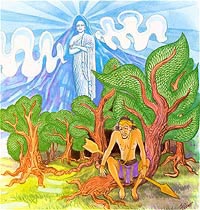
Verse 304. The Virtuous Are Seen
Afar the true are manifest
like Himalayan range,
yet even here the false aren’t seen,
they’re arrows shot by night.
Explanation: Like the Himalayas, the good are visible even from afar; like arrows shot in the night, the wicked are not seen even though they may be near.

Verse 305. Discipline Yourself In Solitude
Alone one sits, alone one lies,
alone one walks unweariedly,
in solitude one tames oneself
so in the woods will one delight.
Explanation: He who sits alone, lies down alone, walks alone, in diligent practice, and alone tames himself, should find delight in living in the forest.

